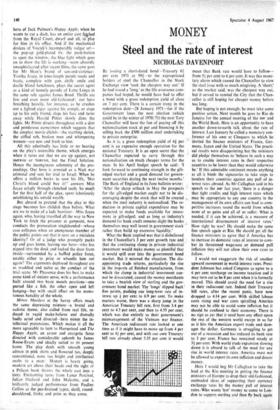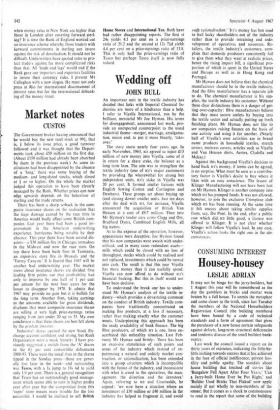Steel and the rate of interest MONEY
NICHOLAS DAVENPORT
By issuing a short-dated bond—Treasury 6+ per cent 1971 at 991—to the expropriated holders of steel the Chancellor in the Stock Exchange view 'took the cheapest way out.' If he had issued a 'long,' as the life assurance com- panies had hoped, he would have had to offer a bond with a gross redemption yield of close on 7 per cent. There is a certain irony in the redemption date-28 January 1971—for if the Government loses the next election (which could be in the winter of 1970/71) the next Tory Chancellor will have the fun of paying off this nationalisation stock at par and financing it by selling back the f500 million steel undertaking to private enterprise.
As it is, a gross redemption yield of 64 per cent is an expensive enough operation for the national Treasury. It is an open secret that the Chancellor expected to carry through this nationalisation on much cheaper terms for the state. In his April budget speech he said: 'I look forward to continuing strength in the gilt- edged market and a good demand for govern- ment securities during the next twelve months.' The Bank of England in its June bulletin wrote: 'After the sharp setback in May the prospects for the gilt-edged market ought not to be dis- couraging despite the stock that will be created , when the steel industry is nationalised. The re- duction in private capital expenditure may be expected to make funds available for invest- ment in gilt-edged; and as long as industry's demand for bank credit remains slight the banks themselves may well invest in government stock rather than build up excessive liquidity.'
What the Bank implied was that it disbelieved in the Chancellor's 3 per cent growth rate and , that the continuing slump in private industrial investment would make money so plentiful that it would spill over into the government bond market. But it misread the situation. The dis- appointing trade returns, particularly the rise in the imports of finished manufactures, from which the slump in industrial investment can- not be dissociated, caused the money merchants to take a bearish view of sterling and the gov- ernment bond market. The 'longs' slipped back five points, pushing our long-term rate of in- terest up 4 per cent to 6.9 per cent. To make matters worse, there was a sharp jump in the American Treasury bill rate, first from 3.4 per cent to 4.3 per cent, and then to 4.55 per cent, which was due entirely to their government's mismanagement of the Vietnam war finance. The American rediscount rate looked at one time as if it might have to move up-from 4 per cent to 44 per cent, and with our own Treasury bill rate already about 5.35 per cent it would
mean that Bank rate would have to follow— from 54 per cent to 6 per cent. It was this mone- tary alarm which caused the Chancellor to view the steel issue with so much misgiving. A 'short,' as the market said," was the cheapest way out, but it served to remind the City that the Chan- cellor is still hoping for cheaper money before too long.
But hoping is not enough; he must take some positive action. Next month he goes to Rio de Janeiro for the annual meeting of the IMF and the World Bank. Here is an opportunity to have another down-to-earth talk about the rate of interest. Last January he called a monetary con- ference of his own at Chequers to which he invited the finance ministers of France, Ger- many, Japan and the United States. The practi- cal results were disappointing but the ministers did pledge themselves to 'behave in such a way as to enable interest rates in their respective countries to be lower than they would otherwise be.' If this admirable sentiment means anything at all it binds the signatories to take steps to insulate their countries against any pull of in- terest rates abroad. As Mr Callaghan said in his speech to the IMF last year, 'there is a danger that tight credits and high interest rates which may be appropriate to any one country in the management of its own affairs can lead to com- petitive increases round the world from which none of us gains and all of us suffer. What is needed, if it can be achieved, is a measure of international disarmament of interest rates.' How right he was! He should make the same fine speech again at Rio. He should get all the finance ministers to agree that if America has to increase its domestic rates of interest to com- bat its threatened wage-cost or demand pull inflation they will not allow their own rates to follow.
I would not exaggerate the risk of another upward movement in world interest rates. Presi- dent Johnson has asked Congress to agree to a 6 per cent surcharge on income taxation and it may turn out to be 8-per cent when it is formally moved. This should avoid the need for a rise in their rediscount rate. Indeed their Treasury bill rates, after the recent panic, have now dropped to 4.14 per cent. With skilled labour costs rising and war costs spiralling America- may not be able to avoid some inflation but it should be confined to their economy. There is no sign as yet that it need have any effect upon the rest of the western world except in so far as it hits the American export trade and dam- ages the dollar. Germany is struggling to get out of a recession and has reduced its bank rate to 3 per cent. France has remained steady at 34 per cent. With world trade expansion slowing down it is absurd to talk of the need for any rise in world interest rates. America must not be allowed to export its own inflation and dearer money.
Here I would beg Mr Callaghan to take the lead at the Rio meeting in getting the finance ministers of Europe to drop their old-fashioned, outmoded ideas of supporting their currency exchange rates by the money pull of interest rates.- Who wants 'hot' money to come to Lon- don to support sterling and then fly back again when money rates in New York are higher than those in London after covering forward !tell- ing? It is time the Bank of England worked out an insurance scheme whereby those traders with forward commitments in sterling can insure against the risk of devaluation. It should not be difficult. Underwriters have quoted rates to pro- tect traders against far more complicated risks than that. All 'leads and lags' would end if the Bank gave our importers and exporters facilities to insure their currency risks. I present Mr Callaghan with a new slogan. He must not only press at Rio for international disarmament of interest rates but for the international debunk- ing of the money ritual.































 Previous page
Previous page